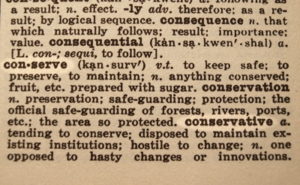 The conservatism bias is a psychological scenario in which people insufficiently revise their beliefs when they are presented with new evidence. To put it another way, people will put more weight into the former evidence that they had than new evidence that they are given. It doesn’t mean that people refuse to change their old beliefs, but rather that the manner in which the new evidence is allowed to affect their former beliefs is inadequate when compared to the amount the belief should have shifted.
The conservatism bias is a psychological scenario in which people insufficiently revise their beliefs when they are presented with new evidence. To put it another way, people will put more weight into the former evidence that they had than new evidence that they are given. It doesn’t mean that people refuse to change their old beliefs, but rather that the manner in which the new evidence is allowed to affect their former beliefs is inadequate when compared to the amount the belief should have shifted.
The conservatism bias was first discussed by Ward Edwards in 1968, who used the examples of two bags filled with poker chips. One had more blue chips than red, the other the opposite. After taking a random sample of chips that presented people with eight reds and four blues, the participants were then asked to decide which bag they had. Most answered around .7, even though the correct answer was more like .97, meaning that people are likely to update their beliefs conservatively.
What Is Conservatism Bias?
 Put simply, the conservatism bias is the tendency for people to use the existing information that they have to hand to form opinions and make decisions, failing to allow any newly presented evidence to sufficiently alter their thoughts. It is not that they refuse to move their opinion at all when presented with the new evidence, but rather that people are almost sceptical about what this new evidence is actually telling them and they therefore offer the old evidence a higher value.
Put simply, the conservatism bias is the tendency for people to use the existing information that they have to hand to form opinions and make decisions, failing to allow any newly presented evidence to sufficiently alter their thoughts. It is not that they refuse to move their opinion at all when presented with the new evidence, but rather that people are almost sceptical about what this new evidence is actually telling them and they therefore offer the old evidence a higher value.
People will often act in a conservative manner because they know that it will offer them not the very best benefits but guaranteed benefits. It is about a person struggling to see new information for what it is worth without first seeing it in a wider context. Rather than adjusting their opinion to take the new evidence on board in the manner that it should be, conservatism bias sees people fall back on what they already know and trust rather than taking a risk on something that they haven’t experienced before.
Examples Of Conservatism Bias In Action
 We know that people with a university degree are statistically more likely to end up in a job that pays well than those that don’t go to university. Those that are in the process of deciding what to do with their lives might well be more inclined to go to university than enter a career that they would enjoy more, simply because they are risk averse. Showing them information about people who chose the career their thinking about succeeding should make them more inclined to do the same, but they don’t.
We know that people with a university degree are statistically more likely to end up in a job that pays well than those that don’t go to university. Those that are in the process of deciding what to do with their lives might well be more inclined to go to university than enter a career that they would enjoy more, simply because they are risk averse. Showing them information about people who chose the career their thinking about succeeding should make them more inclined to do the same, but they don’t.
This is because the conservatism bias is telling them that the road less travelled is a more dangerous one to go down. They are as good as guaranteed a better-paid job if they go to university, the evidence is telling them, so they want to head down that route and ‘play it safe’. Showing them evidence of someone else succeeding by doing what they would most like to do might make them consider it a little bit, but not enough to get them to actually change their mind about their course of action.
Imagine, for a moment, that you enjoy playing five-a-side. You’ve been asked to play in a team with some friends but last week you saw someone break their leg in a horror tackle so you’ve decided not to. Your friend shows you videos of the team playing every day and no one ever getting injured, but the evidence isn’t enough to get you to change your mind. Your conservatism bias is making you think that injuries are more likely than they actually are and evidence to the contrary isn’t swaying you enough, so you play it safe.
The Conservatism Bias In Betting
 It is a fact of life that human beings are not keen to admit that they’re wrong. As a result, we will often ignore evidence that goes against what we have previously decided that we believe. This is especially the case when the new information that we’re presented with is complex and tricky for us to get our heads around. Rather than work hard to understand what it is we’re being told, we’re more likely to only take it slightly into consideration, instead offering more weight to what we already know to be true.
It is a fact of life that human beings are not keen to admit that they’re wrong. As a result, we will often ignore evidence that goes against what we have previously decided that we believe. This is especially the case when the new information that we’re presented with is complex and tricky for us to get our heads around. Rather than work hard to understand what it is we’re being told, we’re more likely to only take it slightly into consideration, instead offering more weight to what we already know to be true.
Unlike the ostrich effect, in which we ignore the new information that we’re presented with, conservatism bias leads us to change our thinking slightly, but nowhere near enough to make the difference that it should. Let’s imagine, for example, that you’re thinking of betting on Liverpool in a match against Everton. Liverpool have beaten their city neighbours the last ten times the teams have played and are unbeaten in their last 20 matches in all competitions, so you know that they’re going to win.
Prior to placing your bet, you’ve been told that Liverpool’s goalkeeper and star striker have been involved in a training ground accident, so they’re both going to be missing for the match. This information should make you think that Liverpool’s chances of winning are severely reduced, but instead you look at the new knowledge you have, weigh it up against the knowledge that you had before and decide that your prior knowledge is worth more than the new information that you’ve been given.
You don’t ignore the information entirely, but instead of severely reducing your planned bet you change your stake money from £50 to £40. The correct move would be to look to hedge your bet, taking into account the loss of two of Liverpool’s best players. Those that suffer from the conservatism bias, however, are too slow to react to the unfolding situation and instead don’t do what they should, putting them in a position where they lose more money than they needed to.
Avoiding The Conservatism Bias
 As with all cognitive biases, we want to work hard to avoid falling foul of the conservatism bias when we’re engaged in our betting process. The best way to do that is to act quickly and decisively when we’re given new information, ensuring that we work hard to give it the same weight in our thinking as we give information that we already have. The best bettors are constantly evaluating the wagers that they’ve placed, working hard to ensure that they’re not wedded to one way of thinking.
As with all cognitive biases, we want to work hard to avoid falling foul of the conservatism bias when we’re engaged in our betting process. The best way to do that is to act quickly and decisively when we’re given new information, ensuring that we work hard to give it the same weight in our thinking as we give information that we already have. The best bettors are constantly evaluating the wagers that they’ve placed, working hard to ensure that they’re not wedded to one way of thinking.
If new information that you receive is hard to understand then look to find a person or a website that can break it down simply for you. The last thing you want to do is to ignore something simply because you don’t understand it. Treat it as though it is critical information and it is vitally important that you understand it, that way you will be less likely to fail to take it on board. It is incredibly important to take big information on board if you want to avoid being in a situation where you might lose more money than you need to.
